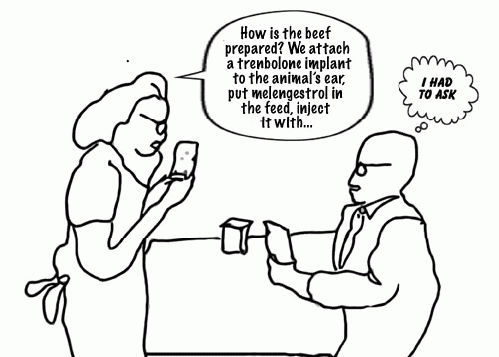Food consumers seldom hear about the drugs oestradiol-17, zeranol, trenbolone acetate and melengestrol acetate and the names are certainly not on meat labels. But those synthetic growth hormones are central to U.S. meat production, especially beef, and the reason Europe has banned a lot of U.S. meat since 1989.
Zeranol, widely used as a growth promoter in the U.S. beef
industry, is known for its "ability to stimulate growth and proliferation
of human breast tumor cells" like the "known carcinogen
diethylstilbestrol (DES)," says the Breast Cancer Fund, a group dedicated
to identifying and eliminating environmental causes of breast cancer. Zeranol may "play a critical role
in mammary tumorigenesis" and "be a risk factor for breast
cancer," agrees a recent paper from the College of Food Science and
Nutritional Engineering at China Agricultural University in Beijing.
Why is such a drug, that requires "Appropriate Personal Protective Equipment" for use-- "laboratory coat, gloves, safety glasses and mask"--routinely used in U.S. meat production and not even labeled?
Melengestrol acetate, a synthetic progestin put in feed, is 30 times as active as natural progesterone, says the European Commission (EC) and trenbolone acetate, a synthetic androgen, is several times more active than testosterone. Trenbolone acetate is administered as ear implants commonly seen at livestock operations. Operators say the implants and the ears are removed from the human food supply at the slaughterhouse. Do they become feed for other animals?
Why does the European Commission ban meat made with such chemicals? "There is an association between steroid hormones and certain cancers and an indication that meat consumption is possibly associated with increased risks of breast cancer and prostate cancer," says the EC's Committee on Veterinary Measures. "The highest rates of breast cancer are observed in North America, where hormone-treated meat consumption is highest in the world," it says, adding that the same statistics apply to prostate cancer.
In fact, Kwang Hwa, Korea, has only seven new cases of breast cancer per 100,000 people, says the EC report, whereas non-Hispanic Caucasians in Los Angeles have 103 new cases per 100,000 people. The breast cancer rate also increases among immigrant groups when they move to the U.S., says the report, suggesting causes are not genetic but environmental. In the overarching search for a "cure," is the "cause" of a lot of possible U.S. breast cancer overlooked?
Another growth drug used in U.S. beef, pork and turkey--yes turkey--is ractopamine an asthma-like drug called a beta agonist. Like growth hormones, ractopamine lets livestock operators produce more weight more quickly from their animals. Ractopamine was integrated into the food supply under reporters' and consumers' radar more than ten years ago. It became a favorite on U.S. farms when its ability to increase muscle by "repartitioning" nutrients and slowing protein degradation was discovered in a laboratory.
(Note: You can view every article as one long page if you sign up as an Advocate Member, or higher).






